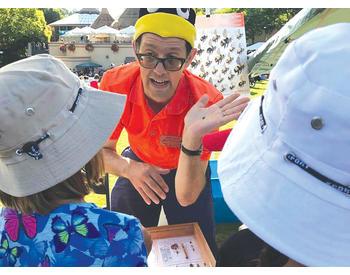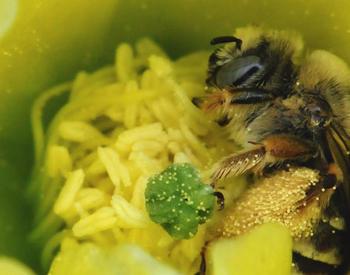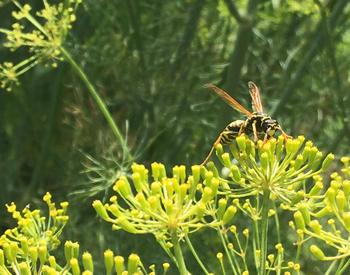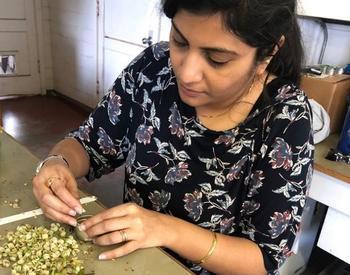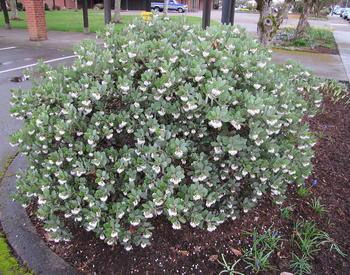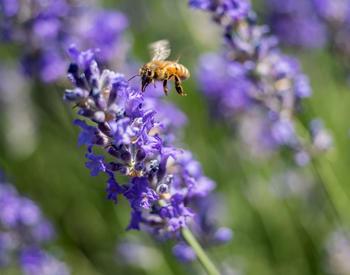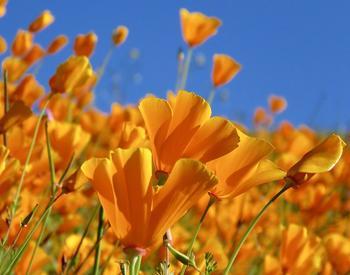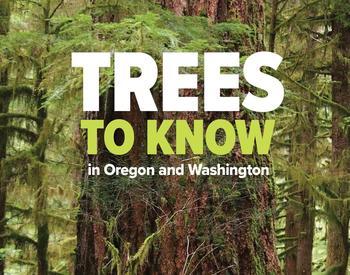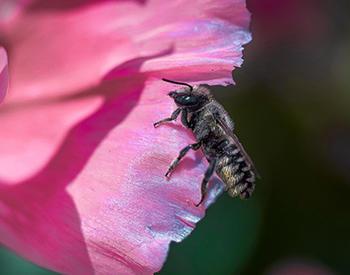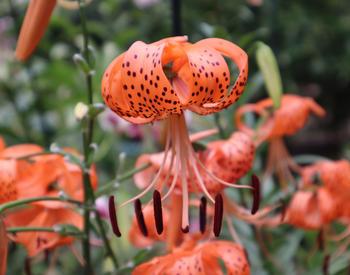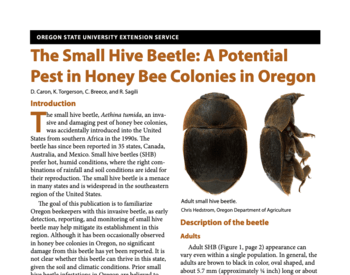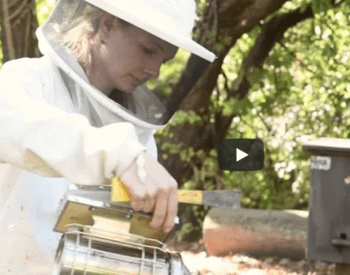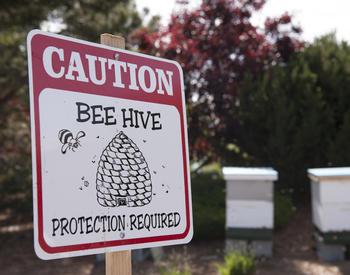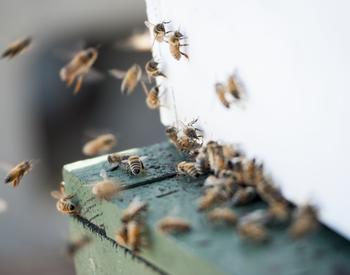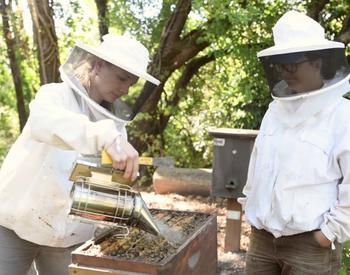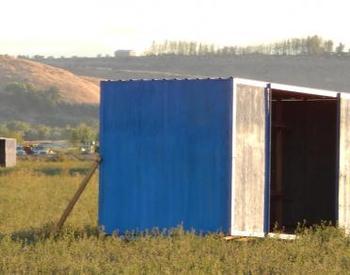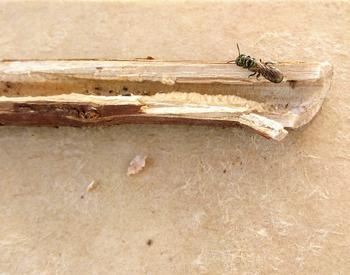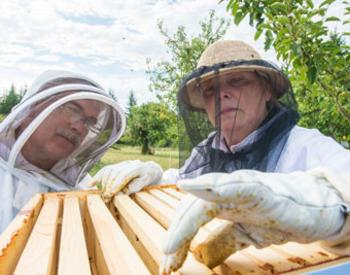Transcript
Speaker 1: From the Oregon State University Extension Service, this is Pollination, a podcast that tells the stories of researchers, land managers, and concerned citizens making bold strides to improve the health of pollinators. I'm your host, Dr. Adoni Melopoulos, assistant professor in pollinator health in the department of horticulture.
Next week is literally my favorite week of the year. It's National Pollinator Week. It is our opportunity to celebrate all the pollinating creatures that are living here in the United States. It is an initiative that involves everybody from farmers' market stalls, people talking about butterflies, bees, and hummingbirds, to really big educational events that are going on.
There's one that I noticed is coming. USDA is running a webinar series. But really behind the scenes of the success of Pollinator Week has been an organization called Pollinator Partnership. Now, I've had various staff members from Pollinator Partnership on past episodes, but this episode is really special. We're going to have three members of Pollinator Partnership talking about National Pollinator Week. But some of the great initiatives that Pollinator Partnership itself has been able to pull off in the past year is really exciting, especially after a year of COVID to see such success stories and such movement forward in terms of bringing people to the conversation around pollinator protection who may not have been there before. So without further ado, sit back and enjoy this conversation about National Pollinator Week and the expanding realm of people involved in pollinator protection with Pollinator Partnership this week on Pollination. Well, we've crammed our virtual studio here on National Week before National Pollinator Week with various key staff from Pollinator Partnership. Maybe just to begin the episode here, let's just go around and introduce yourselves to our listeners.
Speaker 2: Sure. Yeah, I'm Laura Miranda and I'm the Research and Conservation Director for Pollinator Partnership Canada and Pollinator Partnership US.
Speaker 3: Hi, everyone. So my name is Anthony Calangelo and I'm the Communications Coordinator at Pollinator Partnership and Pollinator Partnership Canada. Yeah.
Speaker 4: So my name is Isaac Lyle and I'm our Database and Systems Manager here, involved with a lot of our back-end work and a lot of B-Friendly Farming work.
Speaker 1: Okay, Anthony. Well, let's start with you. National Pollinator Week is next week. We had a great episode with Kelly Rourke a couple of years ago where she explained the origins of National Pollinator Week. But maybe just lead us through what to expect in Pollinator Week 2021.
Speaker 3: Yeah, for sure. So Pollinator Week is an annual celebration and a call to action to help pollinators and learn more about them. It's a time when we can all come together as a community, even virtually, to spread the word about what we can do to protect them. So the cool thing about Pollinator Week is that you can celebrate and get involved any way you like. And we love to ask our audience to share their pollinator stories with us and what pollinators mean to them, especially on social media using the hashtag Pollinator Week.
Speaker 1: That's great. It really is the event that sort of binds us all together. It happens annually. Everybody across the US participates. And it's been something that's been around for quite a few years, right?
Speaker 3: Yeah, so Pollinator Week actually started in 2006. Pollinator Partnership's director of programs, Lori Davies-Adams, and Dr. Larry Stritch of the US Forest Service. And then when the US Senate unanimously approved the idea of designating the third week of every June as National Pollinator Week, that's kind of when it all kicked off. And this marked a necessary step toward addressing the urgent issue of declining pollinator populations. So yeah, I think we're coming into our 14th year of Pollinator Week. And my personal, I think this is my fourth that I've been on the team for this. I'm really excited.
Speaker 1: Fantastic. Well, tell us a little bit about what's going to happen. I remember last year, Pollinator Partnership, you go to the map for National Pollinator Week. There's events being hosted by a variety of organizations.
But I know Pollinator Partnership really stepped up last year and did a lot of virtual events during the pandemic. But what do people have to look forward to next week?
Speaker 3: Yes, we have some changes going on this year. So we do have a new website for Pollinator Week. That's a little more user-friendly, more accessible, a little more colorful. And on that website, we have a really cool event map that we've updated this year that our audience and that people wanting to participate can go on and add their events. And so we're already noticing a ton of events being added onto the map across North America. And even we're getting some events worldwide, which is incredible.
So yeah, that's kind of what to look out for this year. A couple other big initiatives for Pollinator Week that are going on are we're doing a Facebook Live series for the first time this year. Oh, great. I'll be I'll be kicking that off on Monday, June 21st, talking about obscure pollinators and maybe some of the more overlooked groups of pollinators, such as lemurs and lizards and possums. So I'm really excited about that. We're also featuring Chris Hyatt, the vice president of the American Honey Producers, who's going to be doing a live show in the bee yard.
Oh, wow. Which I think people really like. And also Pollinator Partnerships Holly Frayner. And she's going to go behind the scenes at Mason State Nursery and kind of show everyone at the greenhouse and how to properly clean seed and then plant your own pollinator garden.
Speaker 1: Oh, that sounds fantastic. So we're going to get a nice, broad overview of the different, different, strange and weird pollinators, not the ones that we're used to. We're going to immerse ourselves in in an apiary. And then we're going to go walk around the nursery and pick out plants. I love that.
Speaker 3: Exactly. It's going to be a really fun week.
Speaker 1: Well, the other the other thing that I often think about every National Pollinator Week, I've got these wonderful posters that NAPSE puts out every year. Tell us, and there's a new poster for this year. And I think it really links up with, you know, what Isaac and Laura are going to talk about. Tell us about the poster this year.
Speaker 3: Yeah. So our poster this year is called Pollinators in Agriculture, a partnership on the land. It's a really cool depiction of just how important pollinators are to our agricultural systems and ecosystems. And actually maybe Isaac can talk a little bit more about that. I know he's an expert on our poster. Okay.
Speaker 4: Yeah, I do. I do deal a lot with our poster. Yeah. So our theme, as Anthony said, is pollinators in agriculture. Trying to depict in a way that's really beautiful and artistic, the harmony that can be achieved between agricultural landscapes and pollinators when they embrace pollinator-friendly management practices. And so there are commonly found pollinators in agricultural settings featured on the poster as well as their forage plants, but also best management practices for maintaining healthy populations of both managed pollinators like honeybees and wild pollinators in farm settings. And a lot of these best management practices that are focused on in the poster are direct reflections of our bee-friendly farming criteria. This year as well as last year, we've created an online version, an online interactive version of the poster.
Oh, really? Yeah, you can just find that on our website. And we made it through Prezi, but you can click on the different components and zoom in for more information on whether it's the pollinator species, the plant species, or the best management practice. It's designed to be accessible for really all levels of interest while also being really scientifically accurate and providing good technical resources to growers.
Speaker 1: You know, I see the poster you have behind your head in the screen, the trees for bees. That's the one on my office door. If people haven't seen these posters in the past, they're really works of art. It's really well composed.
All the elements sort of fit in, but it's not like a technical drawing or something. It really is something that you can return to. That year's poster specifically, it just kind of highlights these trees specifically that people might overlook. So in this poster, we're seeing a working landscape. We're seeing almost a sort of like walk in and all these elements are sort of brought to your attention that make a bee-friendly farm.
Yeah, exactly. I do want to say I always love pollinator partnerships, graphics. I know one thing I've appreciated over the past year for those of you who follow on Facebook or Twitter are the kind of like weekly bee pictures or pollinator pictures. They're really well rendered.
The artistry, the lost art of like line drawing and sort of depicting these wonderful pollinators was just a little bit of a life history tidbit. That's been great. And if you're not following on social media, it's well worth it. You should. So I guess what I'd like to maybe transition onto is both Isaac and Laura, you're both working on initiatives that have been part of pollinator partnership for a while, but really have kind of gone into a different gear this year. So maybe Isaac, just tell us a little bit about bee-friendly farming. It's been around for a while. What's and we did have a previous episode, which I would really encourage people with Miles talking about the program. But just tell us where the program just briefly where the program came from. And what are some of the changes that have happened this year?
Speaker 4: Yeah, sure. And I don't want to overlap necessarily too much with that previous episode. So I'll try to keep it kind of higher high level here. But this was originally started by a woman in Sonoma in California, in collaboration with some experts that you may have heard of like Sam Droghi, Mace Von, Dennis Van Engelsdorp in the pollinator field. And I believe originally it was designed as a way to connect beekeepers with farms or with areas that would be safe for them to keep their bees. And that program rather quickly kind of grew beyond her means to manage it. And she began looking for other organizations to take that on from her. It eventually landed with us back in 2013.
And it just kind of still continued to grow. And over the past two or three years, we've really transitioned the program away from more of a registration type of program where a lot of farmers were signing up to really a rigorous certification program where farmers have to apply. And we review their certification with our program coordinator and we'll get back with them and work with them and provide technical advice for how they can better meet these best management practices and criteria to get involved if they don't meet them already. And this program is overseen by a task force of experts from NAPSEE that you referred to earlier. We've got some government scientists, some academic scientists, also just farmers and ranchers, beekeepers and pollinator partnership staff as well on this task force that really helping provide sound oversight for the program and even maybe helping out some with auditing here or there.
Speaker 1: You know, I recently heard some impacts of this program. So, you know, when we talk with Miles, he was new to the position and it was kind of like still expanding. But it seems like since we talk with Miles and now, like things have expanded quickly and there's been some real dramatic impacts where we've seen farmers really start a conversation like a whole industry, like a whole cooperative starting to talk about pollinator friendly farming in a way that is just astounding. Tell us a little bit about about some of these advances.
Speaker 4: Yeah, so a lot of that really did start last year right around the time. Miles came on board a little bit before then actually the Almond Board of California became really supportive of this initiative, enabled us to hire Miles and really the almond industry has been big adopters of these best management practices. And so that's been really great to see. And just over over 2020, we had over 65,000 acres of crop land certified, which is a really exciting number. And over 20,000 acres of that was pollinator habitat, which is much higher than our required percentage of habitat.
Speaker 1: Let me get this straight. So, you know, you set this minimum, but what you've found is as people enroll, they kind of exceed that minimum. They really kind of like take up the torch and they're really motivated by enrolling in the program.
Speaker 4: Yeah, definitely. You know, we were setting a minimum for what it takes to get into a program, like you said, but we're looking for slow incremental growth over time. We're not looking for farmers to implement what some scientists somewhere might consider ideal habitat or ideal landscape. Now we're looking for sort of gradual change as they see themselves directly receiving benefits. And it seems like that's what we're seeing.
Speaker 1: Well, I really love the task force model as well, because I imagine there's a conversation going on there with various groups and sort of like thinking about where, how you can motivate and inspire farmers to take up this task. And it sounds like a really thoughtful engagement with all these groups and trying to move things forward.
Speaker 4: Yeah, definitely. We like to be not prescriptive in what we're asking farmers to do, but we want to provide guidance and we want to provide guidance in a way that's beneficial for farmers. And I think the task force really is helping with that. And you know, another metric for where we see success and adoption of this outside just the almond industry, starting to maybe get into other industries right now, but a little over a month ago now, Be Friendly Farming Australia was launched. So we're seeing a lot of international interest as well.
Speaker 1: So that's really wonderful. So Australia kind of, I imagine there's a lot of interesting pollinators, but also really kind of high end farms there. This is a great advance. Tell us a little bit about that initiative. So it's very new, I suppose, the details of being worked out. But what can you tell us about the Be Friendly Farming in Australia?
Speaker 4: Yes, we have a local partner organization in Australia called the Weenby Foundation. And just like we're administering Be Friendly Farming in the US and in Canada, Weenby Foundation is administering the program in Australia. And so they've set up their own task force with Australian specific effort experts to oversee the program there.
And the almond industry in Australia is also big. So there's kind of some overlap there. Oh, right. Oh, yeah. Yeah, we're really excited to see where it takes off. We've already gotten quite a bit of adoption from my understanding early on in that program.
Speaker 1: Wow, that's amazing. Well, I have a feeling we're only touching the tip of some new initiatives that pollinate your partnership. So let's take a quick break and we will come right back and find out more about what you're up to. Fantastic.
Well, you know, one thing that I'm a little down about, I, you know, COVID has really got me down in this. The virtual events have been wonderful. I have to admit you guys have done a tremendous job. But, you know, there's something and just kind of connecting with people in this time of, you know, virtual events is difficult. Is there any relief for us, Anthony?
Speaker 3: Yeah, so so Polyner partnerships actually co-hosting the Polyner Power Party with the Electric Power Research Institute. And basically, this is going to be a week long virtual party with each day designated towards a different theme. So we have one day for pollinator artwork, another day for pollinator cooking, some BID and pollinator research presentations, which is all really exciting. And yeah, it's going to be a lot of fun and you can register online and anyone can join.
Speaker 1: Oh, great. So these will be nice kind of casual events that you kind of kind of get in and, you know, mix yourself, make yourself a pollinator drink and absolutely.
Speaker 3: And speaking of pollinator drinks, we just released our new pollinator cookbook and inside recipes for cocktails and appetizers, entrees, desserts, all using ingredients that rely on pollinators. So you should definitely check that out as well.
Speaker 1: I am intrigued by the pollinator cocktail. I'm trying to use honey from bees, but there must be other, there are all sorts of ingredients that are pollinator dependent.
Speaker 3: Yeah, even like different types of fruits can be added in there. And yeah, it's a great list of recipes.
Speaker 1: All right, I'm going to mix myself a drink and join the power party next week. Sounds good to me. I guess the other thing I just quickly wanted to mention is like I was really, one thing we missed when we were talking with Isaac is B-friendly farming has multiple dimensions. I think when I talked with Miles or was a way for beekeepers or partners to sign on, but I was really excited that there was a way to kind of like, because I'm in Oregon, we've got so many beautiful gardens, pollinator gardens, but they're, and I always get asked, I've been by large public gardens, like how can we get recognition for what we're doing? Isaac, there is a solution to this now, right?
Speaker 4: Yes, there is. So about nine months ago, which would have been after you talked with Miles, we launched the bee-friendly farming garden aspect of the program, which is really designed for any type of just non-commercial garden. Even if a company has a garden, but they're not selling produce from it, it can be a part of bee-friendly garden.
There's still, there's an online application system, just like with certified for commercial growers, but it's not a rigorous certification. It's really much more of a membership so that you can be part of the bee-friendly farming community. You get access to a really great sign that you can put up in your garden if you want to show it off that way, and you get access to a lot of the bee-friendly farming resources.
Speaker 1: And I know one of the reasons for doing this is, of course, a sign being able to acknowledge. And we're in the process of doing this at OSU, just kind of, you have to load up our plant lists and talk a little bit about our pest management in the garden. But the thing I think is great is, you know, bee-friendly farming, there's a blog and there's a community. So you kind of like, start to connect together with other people who are doing this kind of work and learning from them.
Speaker 4: Yeah, absolutely. And that's one of the big ideas behind the bee-friendly farming garden. It's not really a rigorous certification, but it's membership of this really great community.
Speaker 1: Well, that does transition really well to switching over to Laura, because I imagine, you know, the Pollinator-Stewards program is something about like getting some knowledge. There must be a lot of people out there who are really interested in taking their landscape and turning it into a pollinator landscape, but the skills and learning how to do it is hard. Can you tell us a little bit about the Pollinator-Stewards program and how it meets that need?
Speaker 2: Yeah, thanks. Thanks, Adoni. So the Pollinator Partnership, Pollinator-Stewards program, or PSE for short, because that's kind of a mouthful, it evolved out of a need. Just like you're saying, we are getting requests from many, many different people, gardeners, conservation practitioners, businesses, government and private land managers. They wanted to have a better understanding of the issues that bees and other pollinators are facing and also wanting to make real change in their communities and landscapes for pollinator conservation. So the idea was born at Pollinator Partnership to create a comprehensive but still accessible training program that could speak to a variety of audiences and give people whether professional land managers, naturalists or gardeners, the education tools and inspiration to help conserve and protect pollinators through direct conservation actions and through educating others, which is really a big part of the certification. We want to have this sort of train the trainer type model because we can't do it all. We need to spread the word and we like the grassroots spreading of knowledge and action.
So certified individuals are able to show that they have knowledge to help pollinators from a science-based organization and that they've taken action to help pollinators through becoming certified and using the certification stamp. So I can go a little bit into a bit more background here, how it evolved. Let's do that for sure.
Yeah, okay. So the first workshops were a couple years ago in Victoria, BC, Canada, and we started with in-person workshops. So these were two-day sessions and had multiple expert presenters, had lots of interaction amongst the students, and included a chance to see restored pollinator habitat and to talk with land managers or farmers or gardeners that had created pollinator habitat. So these workshops were really successful, but by 2020 there was a growing demand for the workshops and certification, but as you can imagine, in-person format is not simple to organize and conduct.
And we of course ran into COVID in early 2020. So we quickly decided that we should redo the workshops in an online format. And along with my partners at Parks Canada Habitat Acquisition Trust and Sandwich Native Plants, we created a 10-part webinar series for people in the coastal BC region, which we rolled out over spring, summer, and fall of 2020. So these recordings are posted.
I'll give more information on that in a bit. But the online program is very similar to the original, and like the in-person workshops, it does involve two parts still. So there's the training, which can be done through the webinars. And then two follow-up activities are required, one each in habitat for pollinators and one outreach or education activity. And we're really flexible in how people can meet these requirements. So after training and activities are verified, participants receive their pollinator steward certification, which is good for life. And our main goal with the program is to give people the tools and knowledge to conserve nature and ecosystem services and make the world better for a better place for people and pollinators.
Speaker 1: I mean, I love the idea because it's so, there are all these steps. You know, I was just weird last night, we were on a haul with a bunch of woodland owners in Oregon, and it's like, you know, dealing with Blackberry. They put down their little plastic solarization and thought they did everything well, and then all the Blackberries started sprouting up. Like, how do you do that? How do you fix that?
How do you get it? Because you know, it looks really great when there's a great hedgerow in place and it's clean and there's no problems and all the everything took. But to get to that step, there's a lot of little skills that you need to learn. I imagine.
Speaker 2: Yeah, yeah, you know, there's the knowledge and the reason for conserving pollinators.
Speaker 1: But then there's also that nitty gritty of how to do it in your actual ecosystem, which can be quite different between different ecosystems, between different areas. So we're really interested in providing knowledge in how to do this, but then also resources for where do you go to find out to troubleshoot and figure out solutions to your problems. It's a great companion. I really, when you talked about, we talked about this a couple years ago, and one of the things I really loved about this is pollinator partnership already has these wonderful, I mean, there's so many regional planting guides. So the elements were there for especially, I was thinking in British Columbia, there's just so many great regional planting guides and sort of like the next step is like how to how to realize that. And I think this is like the next logical step for taking those guides and really kind of making them live on the landscape.
Speaker 2: Yeah, yeah, that's right. We have a lot of these resources, but putting it into a way that's accessible to lots of people, but also specific to the region is really a challenge. But you know, it's been a lot of fun and it's been evolving. So, you know, currently we have this full online training series for the British Columbia area, and it's on our pollinator partnership website. So you can take the training through that. It is tailored to BC, but you know, most of the information is applicable across North America and people are welcome to check that out on our website.
It's under the resources tab. But as well, we're conducting workshops that are specific to different groups right now. So different municipalities or even some participants in our other programs like Project Swallowtail in Ontario, where we're in the process of training 137 people to become certified pollinator stewards. So it really combines well with a lot of our programs, and we're looking into the future to combining this steward certification program with other programs like BCity Canada that we've recently taken over. And then one thing we're really excited to announce with the Pollinator Steward Certification Program is that we're in the process of creating more general online courses that speak to wider geographic area so that more people can benefit from the program, and it'll hopefully result in more pollinator conservation activities, more habitat on the ground. So we're hoping to have some of those ready by fall. As well, we'll be looking to create more of an online community for certified pollinator stewards and people going through the training. So there can be more of that peer-to-peer support and interaction and troubleshooting.
Speaker 1: That's fantastic. Well, imagine you're all also quite exhausted. It sounds like what you've accomplished over the last years, especially under COVID conditions, has been a lot. Where do you see things going in the next year? What's your vision and your horizon?
What are you hoping to accomplish with these programs? I hope you're going to take a little bit of a rest, but after that, after National Pollinator Week, you all should take the day off. But anyways, after that day, what are you going to do?
Speaker 2: Well, you know, Donnie, you're right. Pollinator Week coming up, we're all running full right now, but it's a lot of fun. And we hope we're inspiring a lot of people to learn more about pollinators and conserve pollinators. And from my perspective, what I'm hoping is going to happen in the
Speaker 1: future is more of what we're doing. And there have been some silver linings with COVID. We do have things more in an online format where we can get the word out to a wider range, a wider number of people. And I think that's really important. And then, you know, ask things open up more, I think combining that with in-person events and just taking the lessons we've learned from online, but also knowing we really need that in-person contact for mental health and for, you know, working together. I think that's going to be really exciting over the next few years. Well, I think I'm here here to that.
And I would like to have a cocktail on my hand as I'm doing that. Anthony, what do you sort of, what would your kind of like hopes for the next year and where things are headed?
Speaker 3: Yeah, so definitely after pollinator week, taking a nice little rest. But I'm hoping after that to get out to the field a bit more, to take lots of pictures, lots of pictures of the bees up here in the north in Yellowknife where I'm currently located. And yeah, just trying to get more content for social media and get those high res pictures that people love seeing.
Speaker 1: Yeah, kudos to that. I think pollinator partnership over the past year has really stepped up in terms of its, the education and information that's going out on its social media platform. That's been wonderful.
Speaker 3: Oh, thank you. Really appreciate it.
Speaker 1: Isaac, now bee-friendly farming is now a transnational endeavor with lots of moving parts. What are your kind of hopes for the next year?
Speaker 4: Yeah, I think firstly, I just want to continue to see it to grow, but then also continuing to work on technical improvements for just how all the parts work together and how farmers can share their story better and how we can do a better job sharing the success of farmers.
Speaker 1: I think getting those stories out from those farmers is so important. It's such a key element. And I imagine Laura, the same thing kind of applies to you. You imagine you've got lots of stories of growers that are people who've taken land stewards program and are sort of, those must be inspirational.
Speaker 2: Oh yeah, there's so many inspiring success stories from the steward program, people using their knowledge to create habitat, educate others. So maybe I'll just talk about a few of them in my region in DC, people that are contributing to our island, to making our island a sanctuary for pollinators and spreading the word. So first, Amy Peltier and Nathan Fisk with Parks Canada, they were part of the original in-person workshops. They participated in the training, helping out with the training by sharing their experience and knowledge with the group from creating a one acre native plant meadow at a Parks Canada site on Vancouver Island.
So they've used the knowledge gained from the course as well as continued learning to educate thousands of children that come through the meadow every year with fun and hands-on activities, you know, teaching kids about the pollinators they're seeing, the importance of native plants and how to be good environmental stewards. Another certified steward, Trina McLean, she's with the township of Comox BC. She took the course through the webinars and since then she's restored a long neglected area at one of the parks she's in charge of, she removed invasive plants like ivy and blackberry and has planted a really beautiful and diverse array of native flowering plants and shrubs.
Speaker 3: Yeah, the area looks really incredible now after Trina's work.
Speaker 2: Yeah, and two other fantastic graduates from the online program, Sean Palmer and Kate Romain, they're artists and naturalists and they're stewarding their rural property called Hummingbird Hill which was passed down to Sean from his grandfather and they're using information and techniques learned in the program and they're creating an even better environment for pollinators and other wildlife on their land and what's really great about what they do because they're both artists, they're combining the conservation work with art and community connection. And the last one I'll mention is Miriam Parent from Victoria BC who also took the course through the webinar series. Miriam has been using her knowledge gained in the course to create boulevard pollinator gardens throughout Victoria so you know in a really urban landscape.
Oh wow. Yeah, yeah so it's really great because it really connects with a community that might not always connect with nature. She's putting signs in the garden and bee houses and she's hosted I believe over 10 outreach talks at the various pollinator gardens so it's just really wonderful to see that we can set the seed with the stewardship training and then just really have it flourish.
Speaker 1: Wow, I'm looking forward to this year's you know at the at the NAFSE conference there's always these awards for you know pollinator advocate and I think the nominations are currently open for farmer rancher. There's going to be some stiff competition amongst your programs because some great people out there.
Speaker 2: Yeah, yeah we have the farmer rancher award and we have the pollinator advocate award so you know check those out and see if you or somebody you know would be a good fit for those.
Speaker 1: Yeah Oregon let's get some good Oregon nominations. July 18th I believe is the somewhere in July and somewhere along as the deadlines but anyways those are great stories. I love that these stories are getting out.
I think pollinator partnerships always been great about highlighting adopters early adopters of these techniques so let's take a quick break. I want to come right back. We have this last segment we do with everybody.
I'm so curious to see how you answer from pollinator partnership. All right back in a second. All right we had a long break discussing the concept of this segment so I'm going to start with Isaac who was the quietest during that session. Barely said a word. Isaac is that you have a book recommendation for our listeners.
Speaker 4: So probably my favorite pollinator related book that I've read is The Metamorphosis by Franz Kafka.
Speaker 1: Yeah that's awesome. I just love that book. That came out of left field. You're the first person to so yeah so it tell us a little bit about the book and you know early 20th century novel. Isaac my regard for you has gone up like many levels.
Speaker 4: It's the story of this just kind of everyday salesman who wakes up one morning and he's been transformed into a giant insect inside of his bedroom and it really asks a lot of I think interesting philosophical questions as you read through it and as you try to figure out from his perspective what's happened to him. I just love the story.
Speaker 1: Wow okay Anthony top that.
Speaker 3: I definitely don't think I can top that one and it's directly related to pollinators but still kind of related. So it's called Migrations by Charlotte McConaughey and it follows the last so it's basically a post-apocalyptic book that follows the last group of Arctic turns that make their long migration and so basically it's a call to action about climate change and the environment so that in that way it relates to pollinators because climate change affects you know pollinators as well as all other species but yeah it follows our protagonist Franny Stone as she follows these beautiful Arctic turns to the yeah to the north and of course along the way there's a lot of drama and cool little kind of twists and turns so that would be my recommendation.
Speaker 1: Well that's fantastic. That's a great recommendation. I have to say I've been to the Yukon border once. You're very far north like I the drive from Dawson Creek to the Yukon border seems endless.
Speaker 3: Yeah those turns go very far away. There's a lot of roads that go from the Yukon all the way to Yellowknife so.
Speaker 1: Well fantastic. Laura what's what do you have I saw you kind of looking at your bookshelf as the other two were answering.
Speaker 2: Yeah yeah so many so many books I love some related to pollinators some some related more distantly so I I'm not a real follower so I'm going to give you to Adoni. I love braiding sweet grass and I would suggest everybody read that it's just by Robin Wall Kim Kimmerer.
Speaker 1: It's a recent book right it's only come out in the last couple years or something.
Speaker 2: It's it's been out for a few years now I'm not sure what year it came out but yeah that's just a wonderful look at our interconnectedness with the environment and maybe a new perspective for how we should be looking at our relationship to ecology and to the world in general so I love that one. Okay so now I'm going to take a total 180 here and say my other one of my other favorite books is The Bumblebees of North America by Paul Williams Robin Thorpe Leif Richardson and Sheila Cola. I find myself using this all the time throughout the season so it's a little more technical guide to the bumblebees but you know a lot of people are interested in IDing the bumblebees around them and I think it's it's great to you know dive more into it.
Speaker 1: It's also very racy it has a key to the genitalia of the males. That is true. If you read all the way through you'll you'll be shocked anyways excellent recommend you guys are great. Well the next question I have is your go-to tool and you guys do very different work you work right across from you know social media to working directly with farmers to you know the hardcore techniques of like how to prepare a seed bed so Isaac let's come back to you and what's your kind of go-to tool?
Speaker 4: Probably my favorite is Google Sheets. Oh I love that yeah or maybe even just Excel super useful for lots of stuff especially just transforming a lot of our data and our web mapping that I have to deal with.
Speaker 1: Yeah it's really amazing how these tools have transformed you can really collaborate on on initiatives and be able to and the thing I find really great about some of these online spreadsheet tools is they're not bad anymore they're really functional and there's all sorts of plugins and things you can use.
Speaker 4: Yeah definitely so really handy if I need to geocode some stuff real quick or if I need to automate sending out certificates in response to a farm
Speaker 1: it's really partnership as the Swiss Army Knife of the pollinator world you guys do need to sort of do a lot of different things so Anthony what's in your Swiss Army Knife folder?
Speaker 3: I like that analogy so I think my most important tool being our social media person is just my computer and I guess my phone but I think also my camera I picked up this old use camera from a colleague back in the day for really cheap and yeah just being able to take my first picture of a B and then being able to zoom it up and see what these look like really up close I think that that changed my world and really kind of increased my passion for nature and for pollinators in general. Yeah so probably my camera I'd say.
Speaker 1: Well it does speak really true to sort of pollinator partnership social media feed because what I've been really impressed with is the detail in natural history that is coming across like it's I always am delighted and repost the information there because it's much more than a one bite and three is you know there's a lot of information out there that's reproduced but it's really novel information like it's really high quality you guys excel at that.
Speaker 3: Yeah and what I do with our social media too is I kind of learn along the way so I'm learning with our audience so basically every day I'll pick a topic that I'm interested in and then I'll research it and then once they feel comfortable with it I'll post it and try to follow it up with a really nice picture either from someone from pollinator partnership or you know one of the other organizations that we follow and yeah so it's been fun I've learned a lot over these last few years.
Speaker 1: That's amazing Laura what do you have as your go-to tool?
Speaker 2: Well I think in the times when we're in person I think my go-to tool really is my display insect collection my pollinator insect display you know it just really gives people that wow these are the bees really they look this different they're all these different sizes these are all bees and I have ones in there that are not bees they're flies but they look an awful lot like bees so I think that's one of one of my tools that I enjoy using the most and I think has a really big impact.
Speaker 1: I remember my technician and I she was with the Department of Agriculture went to the Oregon the potato growers in eastern Oregon hard crowd to talk to pollinators about and they largely ignored us until they saw the display and then they said I've seen this bee I've seen it and it's suddenly you had a conversation with a group that you just never had a conversation with I love those displays they're so powerful.
Speaker 2: Yeah I find the same thing as well it really can start a conversation and really open people's world to what's out there.
Speaker 1: Fantastic okay our last question that I have for you guys is always a toughie is there and especially since you guys are the pollinator pollinator partnerships so you're not like you're not restricted to bees or invertebrates for that matter so I'm just wondering is there a pollinator species that you hold dear in your heart Isaac how about yourself?
Speaker 4: Yeah you know I really love the monarch butterfly I'm from the suburbs of Dallas Texas and growing up as a kid just walking outside and seeing the migration going over was one of the coolest things yeah I think that's my answer.
Speaker 1: Fantastic great answer Anthony how about yourself?
Speaker 3: I'm from East the ruby throated hummingbirds I think they're so beautiful and they look like little flying emeralds when the sun hits them at that perfect angle and we see the the males red throats yeah they're they're truly beautiful birds.
Speaker 1: Fantastic that's great and Laura how about yourself?
Speaker 2: I think it changes all the time but I think right now my favorite is the pebble bee dianthidium we're seeing them in this meadow restoration that we did recently where we did not see these bees before so they're little wasp like looking bees they have markings on them yellow and black markings on them and I'm just so excited when I see those.
Speaker 1: Now their nests are kind of like these little their resin and pebbles right that's the that's right yeah I've seen pictures I've never seen one myself but the pictures of them they're like the oddest looking things you'd never guess it was a bee nest.
Speaker 2: Yeah yeah totally unless you knew what you were looking for.
Speaker 1: Well fantastic you guys thank you so much for joining us I'm good luck with National Pollinator Week I'm sure it's going to be a success and I'm really excited to be coming to these Anthony the power parties right? Yeah the Pollinator Power Party. Pollinator Power Party put the pop filter on and with my cocktail in hand great well good luck next week you guys and happy Pollinator Week.
Speaker 4: Thanks so much happy Pollinator Week.
Speaker 2: Thanks so much happy Pollinator Week.
Speaker 1: Thank you so much for listening the show is produced by Quinn Synan Neal who's a student here at OSU in the New Media Communications Program and the show wouldn't even be possible without the support of the Oregon legislature the Foundation for Food and Agricultural Research in Western Sar. Show notes with links mentioned on each episode are available on the website which is at pollinationpodcast.oregonstate.edu. I also love hearing from you and there are several ways to connect with me the first one is you can visit the website and leave an episode-specific comment you can suggest a future guest or topic or ask a question that can be featured in a future episode but you can do the same things on Twitter Instagram or Facebook by visiting the Oregon Bee Project. Thanks so much for listening and see you next week.
With National Pollinator week next week, we caught up with staff at Pollinator Partnership (P2) to learn about what’s happening to celebrate the week, but also to catch up on growing P2 initiatives; Bee Friendly Farming and the Pollinator Stewards program.
National Pollinator Week website: https://www.pollinator.org/pollinator-week
Bee Friendly Farming: https://www.pollinator.org/bff
